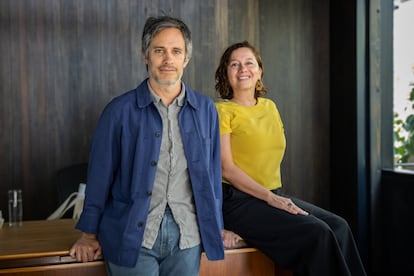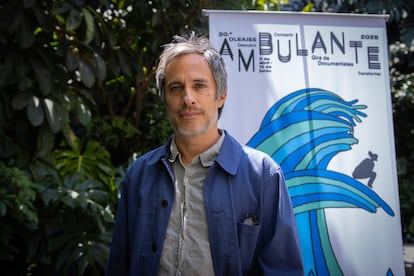Gael García Bernal: ‘Documentaries bring logic to the madness we’re living in’
The Ambulante Documentary Film Festival, the traveling festival co-created by the Mexican actor, celebrates 20 years of bringing this genre to diverse corners of Mexico


Ambulante Documentary Film Festival, Mexico’s oldest traveling documentary film festival, is celebrating its 20th anniversary. The initiative was born from the passion of two friends at the Morelia Film Festival in 2005. These film-loving friends were Gael García Bernal and Diego Luna, who had seen Eugenio Polgovsky’s documentary Tropic of Cancer, which depicts the life of a family selling animals and plants along a desert highway on the border between the Mexican states of San Luis Potosí and Hidalgo, and fallen in love with the movie.
After the screening, they were struck by how important the film was and wondered why it couldn’t be shown in its place of origin. This question emerged from their realization of how filmmaking can impact local communities. While participating in a film festival generates excitement, they noticed that once a film was completed, it was often shown only abroad, maybe at Mexico’s Cineteca Nacional, or people had to travel to big cities to see it.
So, García Bernal said, why not do a rock tour, with bands and documentary films? And so, Ambulante was born. Now, in its 20th edition, the festival is touring five cities over three months, showcasing over 129 titles from 47 countries in 28 languages, including eight Indigenous languages. Among these, 35 are national premieres.
“At first, the idea sounded incredibly crazy, and few people connected with the romanticism we were talking about,” says García Bernal, accompanied by Itzel Martínez, director of Ambulante, from the offices of his production company, La Corriente del Golfo, in Mexico City. “The idea was to do this and for it to survive — not just to be a symbolic or short-lived effort."
Martínez, who has been part of Ambulante for nine years and has served as its operational head for the past three, explains that what began as the vision — or gut feeling — of a few has now become something that belongs to a whole community, and is part of the cultural richness and accessibility of many other regions.
“People are taking it as their own — not just the audience or the filmmakers, but also the exhibitors in each region" says Martínez. “It has become a kind of school, in terms of a shared methodology that continues to expand. People who’ve been through Ambulante now have their own festivals, their own exhibition spaces, or have become producers or directors. It’s a community that keeps growing.”
Ambulante’s 20th anniversary, which kicked off with the screening of My Stolen World — the story of Farah, an Iranian woman who is forced to retreat into her inner world in order to be free — is made up of 11 sections, including international and Mexican films, children’s programming, and a retrospective highlighting films that have played a meaningful role in the festival’s history.
These films, the organizers explain, “remind us of the power of documentary — a form of cinema that addresses the ever-changing nature of the world and the longing to find solid ground.”

García Bernal has seen how documentary filmmaking has evolved over the past two decades. He’s also seen how times and audiences have changed, and how these transformations have affected the subjects documentaries tackle. He also sees an audience that has become “more savvy” over these 20 years: better informed and more capable of navigating the daily chaos of news and information.
Three six-year terms, a pandemic, and the rise of streaming
“In Mexico, the documentary field remains fertile ground for many things. It’s incredible how certain very good documentaries have had a breakthrough, how they’ve triggered so many things that have, in some cases, helped to highlight justice and injustice,” says García Bernal. “They’ve acted as companions to these themes, and that’s something that continues to happen, and hopefully will become even more prevalent. Documentary films are a fantastic tool for unmasking the single narrative, the façade, the historical truth. Documentaries somehow bring logic to the madness and the rush we’re living in.”
There’s reason to be proud of having built and sustained a space over all these years, especially given that Ambulante has weathered more than three six-year presidential terms — some supportive, others not — survived the Covid-19 pandemic, “which hit festivals around the world really hard,” García Bernal points out, and also managed to navigate the way cinema has been increasingly absorbed by the rise of digital platforms.
“Many people have tried to replicate this model and bring it to other countries. And it’s not possible; it’s more difficult elsewhere,” says García Bernal. “That speaks well of Mexico and the need we have to tell certain stories that expose the reality that, in some cases, has been imposed.”
But what is needed to further promote and boost the documentary industry? “Institutional and governmental support, definitely. Private investment. A professionalization of the people who make documentaries. Greater efforts to ensure that production is part of the exhibition, of the process, so that it attracts audiences. There are many factors,” affirms the actor.
Martínez agrees with García Bernal and emphasizes that this is a conversation that must be held among many film lovers. One that helps identify what’s missing — beyond relying solely on investment from digital platform owners: “It’s about finding new ways for documentaries to be seen. Making sure they’re given the chance to connect with audiences, and considering a real push for theatrical releases — not just film festivals, but much broader distribution. Giving them the opportunity to be part of the box office could be a challenge worth exploring.”
Sign up for our weekly newsletter to get more English-language news coverage from EL PAÍS USA Edition
Tu suscripción se está usando en otro dispositivo
¿Quieres añadir otro usuario a tu suscripción?
Si continúas leyendo en este dispositivo, no se podrá leer en el otro.
FlechaTu suscripción se está usando en otro dispositivo y solo puedes acceder a EL PAÍS desde un dispositivo a la vez.
Si quieres compartir tu cuenta, cambia tu suscripción a la modalidad Premium, así podrás añadir otro usuario. Cada uno accederá con su propia cuenta de email, lo que os permitirá personalizar vuestra experiencia en EL PAÍS.
¿Tienes una suscripción de empresa? Accede aquí para contratar más cuentas.
En el caso de no saber quién está usando tu cuenta, te recomendamos cambiar tu contraseña aquí.
Si decides continuar compartiendo tu cuenta, este mensaje se mostrará en tu dispositivo y en el de la otra persona que está usando tu cuenta de forma indefinida, afectando a tu experiencia de lectura. Puedes consultar aquí los términos y condiciones de la suscripción digital.








































